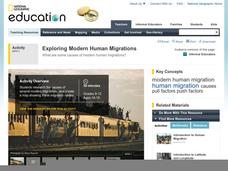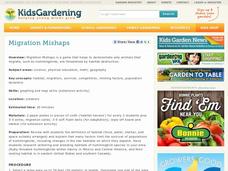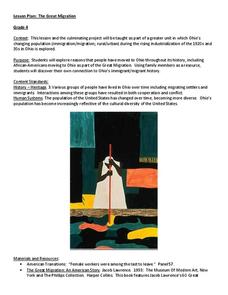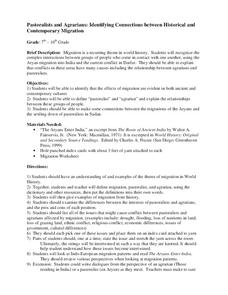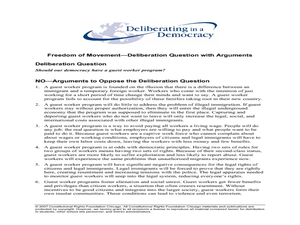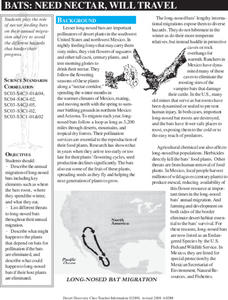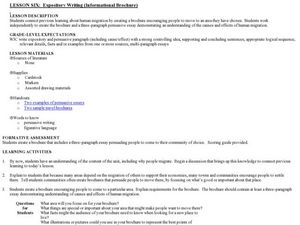National Geographic
Exploring Modern Human Migrations
Using maps, images, websites, and handouts, learners work to understand the nature of human migrations. They compare and contrast human migration from the past to the present, identify causes for migration, and trace migration routes on...
National Gardening Association
Migration Mishaps
Elementary ecologists pretend to be migratory hummingbirds. They fly between wintering and nesting grounds, trying to reach a habitat haven. In a musical-chair fashion, some birds will miss out, and are removed from the game. To further...
National Geographic
Genetic Markers: Connecting the Dots
Biology buffs simulate how genetic markers are passed among populations in order to understand how these markers can help anthropologists map human migration. A couple of volunteers leave the room while you walk the remaining learners...
Curated OER
Why do People Migrate?
Second graders examine the reasons for human migration. In this human migration lesson, 2nd graders make lists of reasons why people migrate. Students view pictures of people who have migrated and discuss why. Then the students watch a...
Curated OER
Past and Present Trends in Human Migration
In this history worksheet, young scholars will complete a chart about human migration in/from Ireland, Germany, and England in the early 18th century. Students will input information about the natural resources, crops, climate and...
Curated OER
Human Migration
Students explore human migration, refugees and human rights. They read articles about immigration, create a migration journal, and participate in a mock human rights commission meeting. After collecting information about immigration,...
Curated OER
The Great Migration
What a terrific lesson! Have your class learn about immigration using this resource. Fourth graders discuss the Great Migration in Ohio through art, writing, and discussion. Afterward, they create a presentation in which they tell their...
National Endowment for the Humanities
“The Great Migration” by Minnie Bruce Pratt
Minnie Bruce Pratt's poem, "The Great Migration," offers young scholars an opportunity to reflect on how where we come from influences who we are. Groups conduct a close reading of the poem, recording observations about the poem's...
Curated OER
Pastoralists and Agrarians: Identifying Connections between Historical and Contemporary Migration
Pastoralists and agrarians, livestock raisers and farmers. Using the conflict in Darfur as a lens, class members investigate the conflicts that arise when these groups are forced to migrate from one area to another.
Prince William Network
Migration Headache
During this game, kids become migratory shorebirds and fly among wintering, nesting, and stopover habitats. If they do not arrive at a suitable habitat on time, they do not survive. Catastrophic events are periodically introduced that...
Curated OER
Trails of Understanding: The Earliest Immigrants
Students research Native American tribes. In this human migration lesson plan, students determine how tribes lived and established cultures. Students create PowerPoint presentations that feature their findings.
Advocates for Human Rights
Human Rights Defined
Class members continue their investigation of the factors that influence migration with a lesson plan on human rights. As they examine the Universal Declaration of Human Rights and selected US Constitutional Amendments, learners compare...
Chicago Botanic Garden
Migration, Adaptation, and Changing Climates
It is easy for humans to adapt to changing environments, but how do animals and plants do it? Classes discuss how plants and animals deal with environmental changes in the second of seven lessons. Through questions and discussions,...
Curated OER
Human Migration in the United States
Learners investigate the factors involved in human migration in the United States. Students analyze maps of different regions in the United States to determine how a variety of factors influence human settlement and development.
Deliberating in a Democracy
Freedom of Movement
Class members examine human migration. For this population lesson, they read an article entitled, "Freedom of Movement" and respond to discussion questions about the article related to guest worker programs.
Curated OER
Migration Waves
Learners examine how migration waves impacted Native American history. They listen to a lecture and take notes, read and discuss handouts in small groups, and create a group table that illustrates the differences and similarities between...
Curated OER
The Real Eve
Students research about human migration during a specific time period. In this physical science lesson, students watch a video about human evolution. They prepare a presentation on human migration and share it with the class.
Curated OER
Examine Economic Factors That Influence Human Migration Along the U.S/Mexican Border
Students bring in their own article about immigration and how it is affecting their community. They summarize their article and brainstorm reasons why someone would immigrate to another country. They discuss push and pull factors.
Chicago Botanic Garden
Seed Dispersal and Plant Migration
There are five methods of seed dispersal. They include gravity, mechanical, animal, water, and air. Scholars study seed dispersal in lesson five of the series of six. Through discussions, hands-on analysis of different seed types, and...
Curated OER
Bats: Need Nectar, Will Travel
Beginning wildlife biologists become adult bats, baby bats, snakes, owls, bobcats, or land-clearing developers in a grand role-playing activity. In a large open space, they play a game in which they move to designated areas based on what...
Curated OER
Agriculture in the Desert
Learners explore human migration. In this human migration lesson, students investigate multiple factors contributing to the growth of major Arizona cities. Learners discover the processes, patterns, and functions of human settlement.
Curated OER
Expository Writing (Informational Brochure)
Students identify the attributes of informative brochures. In this written communication instructional activity, students examine sample brochures and persuasive essays to investigate the layout and the information presented. Students...
Prince William Network
The Incredible Journey
Divide your school gym into breeding grounds and non-breeding grounds so that your zoologists can play a game simulating the seasonal migration of shorebirds. Players pick one of the included game cards and follow its directions, which...
Curated OER
Roots: The Ancestry of Modern People
High schoolers investigate the models for the origin of modern humans and the conditions that facilitate speciation and evolution. The classification and nomenclature of hominid species is also examined.
Other popular searches
- Human Migration Patterns
- Early Human Migration
- Human Migration Maps
- Math Human Migration
- Ancient Human Migration
- Human Migration Geography
- Mapping Human Migration
- Human Migration From Ireland
- Human Migration Africa
- Early Human Migration Maps
- Usa Human Migration
- Early Human Migration Routes


